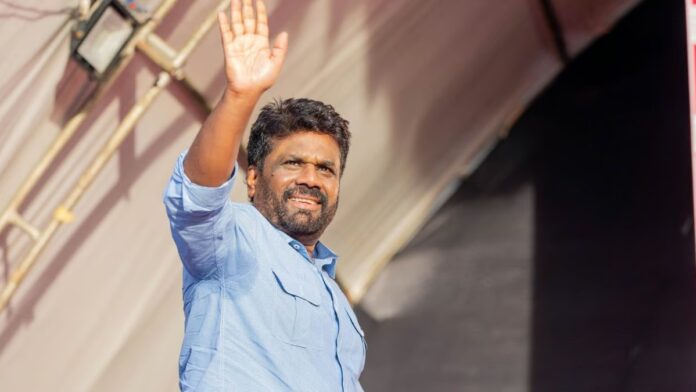Anura Kumara Dissanayake’s Party Secures Landslide Victory
Sri Lankan President Anura Kumara Dissanayake’s National People’s Power (NPP) coalition achieved a historic victory in the snap parliamentary elections, reshaping the island nation’s political narrative. The results showed the NPP securing at least 123 seats in the 225-member parliament, with over 62% of the vote counted so far, while opposition leader Sajith Premadasa’s party lagged far behind with only 18%. This historic mandate reflects the electorate’s overwhelming rejection of traditional political elites held responsible for the devastating 2022 economic crisis that plunged the nation into financial turmoil.
A Unifying Victory In Tamil-Dominated Jaffna
The NPP’s resounding victory marks a significant moment in Sri Lanka’s history, particularly as it secured a historic win in the northern Jaffna district, a Tamil-majority region that has traditionally resisted aligning with Sinhala-dominated leftist parties. This unprecedented support highlights the unifying appeal of Dissanayake’s anti-corruption platform.

Public Frustration Fuels Demand For Change
The economic collapse of 2022 left an indelible mark on Sri Lanka, sparking months of protests, food and fuel shortages, and the storming of then-President Gotabaya Rajapaksa’s residence, which forced his resignation and exile. Dissanayake successfully distanced himself from the political establishment blamed for this crisis, positioning himself as a leader capable of bringing change. IT professional Chanaka Rajapaksha, a supporter of the NPP, remarked that the election symbolized the people’s determination to “get rid of corruption and a corrupt system.”
From Radical Roots To Pragmatic Leadership
Dissanayake’s rise to power is remarkable, considering his party, the Janatha Vimukthi Peramuna (JVP), held only three seats in the outgoing parliament. The JVP, a key constituent of the NPP coalition, has a controversial history, having led two violent insurrections in 1971 and 1987 that resulted in over 80,000 deaths. However, Dissanayake has rebranded the party’s image, emphasizing peaceful reform and economic revival. His office in Colombo still features portraits of communist leaders like Karl Marx and Fidel Castro, but his policies reflect a pragmatic shift. Initially advocating for renegotiating the $2.9 billion International Monetary Fund (IMF) bailout secured by his predecessor, Dissanayake has since committed to honoring the agreement. His willingness to embrace selective privatization and an open economy has gained him cautious support from Sri Lanka’s business community, including the influential Ceylon Chamber of Commerce.

Peaceful Elections Amid Low Turnout
The snap elections, held on Thursday, were among the most peaceful in recent memory, with no reports of violence during the nine-hour voting period. This is a stark contrast to past elections marred by unrest. However, voter turnout was below 70%, a decline from the nearly 80% seen during the September presidential polls. Election officials attributed the lower turnout to voter fatigue and the widespread belief that Dissanayake’s victory was inevitable. Despite the peaceful process, three election workers, including a police constable, tragically died of illness while on duty.
The Rajapaksa Era Ends
The results signal the end of an era dominated by the Rajapaksa family, whose influence over Sri Lankan politics spanned decades. The outgoing parliament, once controlled by Mahinda and Gotabaya Rajapaksa, has now been reshaped by the people’s demand for accountability and reform. Neither brother contested the elections, but Mahinda’s son Namal Rajapaksa, a former sports minister, is seeking re-election. Political analyst Kusal Perera described the opposition as “dead,” emphasizing the lack of any meaningful challenge to the NPP’s momentum.
Economic Optimism Under Dissanayake
Dissanayake’s leadership has also brought a renewed sense of optimism to Sri Lanka’s economy. The Colombo Stock Exchange has gained over 16% since his presidential win in September, reflecting growing investor confidence. His administration’s focus on stabilizing the economy while pushing anti-corruption measures has resonated with both the public and private sectors. Despite his Marxist roots, Dissanayake’s pragmatic policies have positioned him as a leader capable of navigating the complexities of modern governance.
Sri Lanka’s Political Landscape Redefined
The NPP’s landslide victory underscores a seismic shift in Sri Lanka’s political and economic trajectory. With a commanding majority in parliament, Dissanayake is poised to implement sweeping reforms aimed at eradicating corruption and revitalizing the nation. His rise from a laborer’s son to the presidency exemplifies the power of grassroots movements and the public’s ability to demand change.

